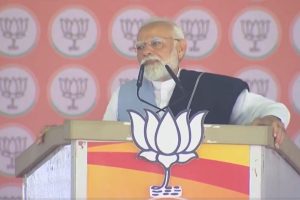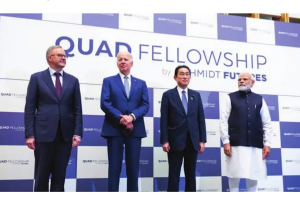In what would have been one of his last public appearances, John Pilger in an address to the Trondheim World Festival in Norway on 8 September 2022, charted the history of power propaganda and described “how it appropriates journalism in a ‘profound imperialism’ and is likely to entrap us all, if we allow it.” Pilger, who passed away on 31 December 2023, remained for over fifty years a doughty courageous war correspondent-author and filmmaker whose works are landmarks in the history of contemporary journalism.
In his address at Trondheim, Pilger began by recounting his chance meeting with Leni Riefenstahl, one of Hitler’s leading propagandists whose epic films glorified the Nazis. It was in the 1970s and Pilger happened to be staying at the same lodge in Kenya, “where she was on a photography assignment, having escaped the fate of other friends of the Fuhrer. She told me that the ‘patriotic messages’ of her films were dependent not on ‘orders from above’ but on what she called the ‘submissive void’ of the German public.” “Did that include the liberal, educated bourgeoisie? I asked.
‘Yes, especially them,’ she said. I think of this as I look around at the propaganda now consuming Western societies. Of course, we are very different from Germany in the 1930s. We live in information societies. We are globalists. We have never been more aware, more in touch, better connected. Are we? Or do we live in a Media Society where brainwashing is insidious and relentless, and perception is filtered according to the needs and lies of state and corporate power?
The United States dominates the Western world’s media. All but one of the top ten media companies are based in North America. The internet and social media ~ Google, Twitter, Facebook ~ are mostly American owned and controlled,” Pilger questioned and informed the audience with characteristic candour. “In my lifetime,” he said, “United States has overthrown or attempted to overthrow more than 50 governments, mostly democracies. It has interfered in democratic elections in 30 countries. It has dropped bombs on the people of 30 countries, most of them poor and defenceless. It has attempted to murder the leaders of 50 countries. It has fought to suppress liberation movements in 20 countries.
The extent and scale of this carnage is largely unreported, unrecognised; and those responsible continue to dominate Anglo-American political life.” John Pilger and the celebrated British playwright Harold Pinter shared a special bond of friendship based on their intellectual freedom and abilities to connect with local and global audiences through their works. Pinter was an artist “who in his plays uncovers the precipice under everyday prattle and forces entry into oppression’s closed rooms,” read the citation of the Nobel Prize for Literature in 2005 which was bestowed upon him.
Pilger, rallying for the cause of free speech and press freedom, recounted Pinter’s extraordinary speeches in the years before the playwright died in 2008. Pinter broke the silence, said Pilger, when he commented, “‘US foreign policy,’ he said, is ‘best defined as follows: kiss my arse or I’ll kick your head in. It is as simple and as crude as that. What is interesting about it is that it’s so incredibly successful. It possesses the structures of disinformation, use of rhetoric, distortion of language, which are very persuasive, but are actually a pack of lies. It is very successful propaganda.
They have the money, they have the technology, they have all the means to get away with it, and they do’.” In accepting the Nobel Prize for Literature, Pinter said: “The crimes of the United States have been systematic, constant, vicious, remorseless, but very few people have actually talked about them. You have to hand it to America. It has exercised a quite clinical manipulation of power worldwide while masquerading as a force for universal good. It’s a brilliant, even witty, highly successful act of hypnosis.”
Said Pilger in his address “Pinter was a friend of mine and possibly the last great political sage ~ that is, before dissenting politics were gentrified. I asked him if the ‘hypnosis’ he referred to was the ‘submissive void’ described by Leni Riefenstahl. ‘It’s the same,’ he replied. ‘It means the brainwashing is so thorough we are programmed to swallow a pack of lies. If we don’t recognise propaganda, we may accept it as normal and believe it. That’s the submissive void’.” Pilger, through his articles, books and films, focussed on systems of corporate democracy, where “war is an economic necessity, the perfect marriage of public subsidy and private profit: socialism for the rich, capitalism for the poor.
The day after 9/11 stock prices of the war industry soared. More bloodshed was coming, which is great for business. Today, the most profitable wars have their own brand. They are called ‘forever wars’: Afghanistan, Palestine, Iraq, Libya, Yemen and now Ukraine. All are based on a pack of lies.” He recounted for the Trondheim festival audience that “Iraq is the most infamous, with its weapons of mass destruction that didn’t exist. NATO’s destruction of Libya in 2011 was justified by a massacre in Benghazi that didn’t happen.
Afghanistan was a convenient revenge war for 9/11, which had nothing to do with the people of Afghanistan. Today, the news from Afghanistan is how evil the Taliban are ~ not that Joe Biden’s theft of $7 billion of the country’s bank reserves is causing widespread suffering. Recently, National Public Radio in Washington devoted two hours to Afghanistan ~ and 30 seconds to its starving people.” Pilger underscored the importance of a strategy document adopted at the NATO summit in Madrid in June 2022.
It called for militarising the European continent and escalating prospects of war with Russia and China. It proposes ‘multi domain warfighting against nuclear-armed peer-competitor’. In other words, nuclear war.” In 2004 ‘Tell Me No Lies’, an anthology, was edited by John Pilger; it was sub-titled ‘investigative journalism and its triumphs’. In its introduction, Pilger paid his tribute to the American journalist T.D. Allman who said, “Genuinely objective journalism is journalism that not only gets the facts right, it gets the meaning of the events right. It is compelling not only today, but stands the test of time.
It is validated not only by reliable sources, but the unfolding of history. It is journalism that ten, twenty, fifty years after the fact still holds up a true and intelligent mirror to events.” When Pilger referred to ‘investigative journalism’, he also explained it and highlighted the need to redefine it. He wrote, “T.D. Allman’s description is a sure starting point, rescuing ‘objectivity’ from its common abuse as a cover for official lies.
The term ‘investigative journalism’ did not exist when I began my career: it became fashionable in the 1960s and 1970s and especially when Bob Woodward and Carl Bernstein exposed the Watergate scandal. In making my selection (for the anthology) I have applied a broader definition than detective work and included journalism that bears witness and investigates ideas. Thus, Phillip Knightley’s account of the London Sunday Times tortuous disclosure of the scandal of the drug thalidomide, which caused terrible foetal malformations in the 1950s and 1960s, sits easily alongside historian, poet and satirist Eduardo Galeano’s expose of the propaganda of war, consumerism and mass impoverishment.” In recalling his conversation with Charles Lewis, the former CBS 60 Minutes star, Pilger quoted Lewis who said, “You know, under Bush, the compliance and silence among journalists is worse than in the 1950s.
Rupert Murdoch is the most influential media mogul in America; he sets the standard, and there is no public discussion about it. Why do the majority of the American public still believe Saddam Hussein was behind the attacks of 9/11? Because the media’s constant echoing of the government guarantees it.” Pilger asked the CBS staranchor, who was now running an investigative unit called the Centre for Public Integrity, “What if the freest media in the world had seriously challenged Bush and Rumsfeld and investigated their claims, instead of channelling what turned out to be crude propaganda?”
Lewis replied, ‘If the media had been more aggressive and more tenacious towards getting the truth, there is a very, very good chance we would not have gone to war with Iraq’.” In the US Congress, it was the lone dissenting voice of Jane Harman who said of the invasion: “We have been the victims of the biggest cover-up manoeuvre of all time”. It is befitting that Tell Me No Lies brought Edward Said’s Culture and Imperialism into its selection.
The Palestinian-American scholar-academician Said had prophetically written, “We are beginning to learn that decolonisation was not the termination of imperial relationships but merely the extending of a geo-political web which has been spinning since the Renaissance. The new media have the power to penetrate more deeply into a ‘receiving culture’ than any other manifestation of Western technology.” Through John Pilger’s works, these manifestations, voids, silences and lies continue to enlighten our worlds.
(The writer is a writerresearcher on history and heritage issues and former deputy curator of Pradhanmantri Sangrahalaya)











